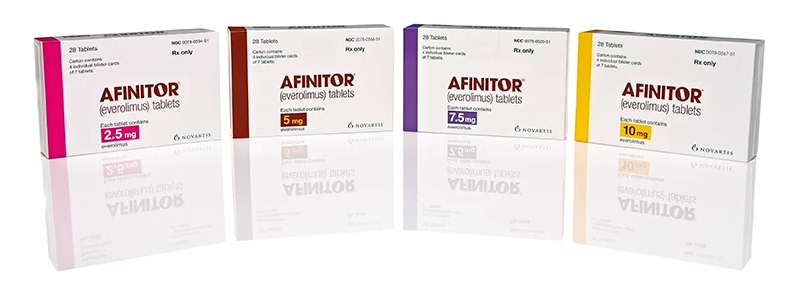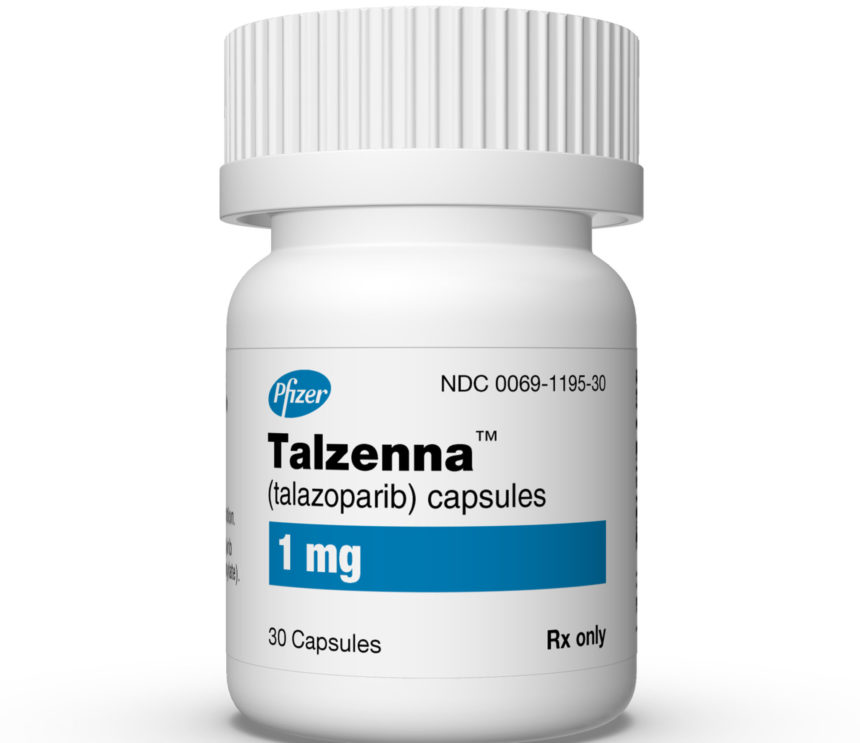Afinitor (everolimus) vs Talzenna (talazoparib)
Afinitor (everolimus) vs Talzenna (talazoparib)
Afinitor (everolimus) is an mTOR inhibitor used to treat various types of cancer, such as breast, kidney, and neuroendocrine tumors, by inhibiting cell growth and proliferation. Talzenna (talazoparib) is a PARP inhibitor indicated for patients with germline BRCA-mutated, HER2-negative advanced breast cancer, and it works by preventing cancer cells from repairing their DNA, leading to cell death. When deciding between Afinitor and Talzenna, it's crucial to consider the specific type of cancer, genetic mutations present, and the patient's overall health profile, as each medication targets different pathways and has distinct indications and side effect profiles.
Difference between Afinitor and Talzenna
| Metric | Afinitor (everolimus) | Talzenna (talazoparib) |
|---|---|---|
| Generic name | Everolimus | Talazoparib |
| Indications | Advanced hormone receptor-positive, HER2-negative breast cancer, advanced neuroendocrine tumors, renal cell carcinoma, tuberous sclerosis complex-associated seizures, and others | Germline BRCA-mutated, HER2-negative locally advanced or metastatic breast cancer |
| Mechanism of action | mTOR inhibitor, which inhibits cell proliferation, angiogenesis, and glucose uptake | Poly (ADP-ribose) polymerase (PARP) inhibitor, which leads to DNA damage and cell death in BRCA-mutated cells |
| Brand names | Afinitor, Afinitor Disperz, Votubia, Zortress | Talzenna |
| Administrative route | Oral | Oral |
| Side effects | Mouth ulcers, rash, diarrhea, fatigue, infections, cough, edema, and others | Anemia, neutropenia, thrombocytopenia, fatigue, nausea, headache, alopecia, and others |
| Contraindications | Hypersensitivity to everolimus or other rapamycin derivatives | Hypersensitivity to talazoparib |
| Drug class | mTOR inhibitor | PARP inhibitor |
| Manufacturer | Novartis | Pfizer |
Efficacy
Efficacy of Afinitor (Everolimus) in Breast Cancer Treatment
Afinitor (everolimus) is a medication that has been approved for use in treating certain types of breast cancer. Specifically, it is indicated for postmenopausal women with advanced hormone receptor-positive, HER2-negative breast cancer. The efficacy of Afinitor in breast cancer treatment has been demonstrated when used in combination with exemestane, after the failure of treatment with letrozole or anastrozole. Clinical trials have shown that the combination of everolimus and exemestane significantly extends progression-free survival compared to exemestane alone. This indicates that Afinitor can effectively slow the progression of certain breast cancers, thereby providing a valuable treatment option for patients with advanced disease.
Talzenna (Talazoparib) and Its Role in Breast Cancer
Talzenna (talazoparib) is a poly (ADP-ribose) polymerase (PARP) inhibitor that has shown efficacy in the treatment of breast cancer, particularly in patients with a germline BRCA mutation. In breast cancer patients with this genetic mutation, Talzenna has been approved for the treatment of HER2-negative, locally advanced or metastatic disease. Clinical trials have demonstrated that talazoparib significantly improves progression-free survival in this patient population. The use of Talzenna for patients with BRCA mutations represents a targeted approach to breast cancer treatment, capitalizing on the specific vulnerabilities of cancer cells with these genetic alterations.
Comparative Efficacy in Breast Cancer Management
When comparing Afinitor and Talzenna, it is important to note that they are used for different subtypes of breast cancer and are not directly comparable. Afinitor is used in combination with hormonal therapy for hormone receptor-positive, HER2-negative breast cancer, while Talzenna is used as a monotherapy for patients with a germline BRCA mutation. Both medications have shown efficacy in their respective indications and represent important advances in the personalized treatment of breast cancer. The choice of treatment depends on the specific characteristics of the breast cancer and the genetic makeup of the patient.
Conclusion
In conclusion, both Afinitor (everolimus) and Talzenna (talazoparib) have demonstrated efficacy in the treatment of certain subtypes of breast cancer. Afinitor, in combination with exemestane, is effective for postmenopausal women with hormone receptor-positive, HER2-negative advanced breast cancer. Talzenna, on the other hand, is effective as a monotherapy for patients with HER2-negative, locally advanced or metastatic breast cancer with a germline BRCA mutation. These medications offer valuable options for personalized cancer treatment, improving outcomes for patients with these specific types of breast cancer.
Regulatory Agency Approvals
Afinitor
-
European Medical Agency (EMA), European Union

-
Food and Drug Administration (FDA), USA

-
Health Canada

-
Pharmaceuticals and Medical Devices Agency (PMDA), Japan

-
Therapeutic Goods Administration (TGA), Australia

Talzenna
-
European Medical Agency (EMA), European Union

-
Food and Drug Administration (FDA), USA

-
Therapeutic Goods Administration (TGA), Australia

Access Afinitor or Talzenna today
If Afinitor or Talzenna are not approved or available in your country (e.g. due to supply issues), you can access them via Everyone.org.
How it works

Make an enquiry
Choose the medicine you want to buy, answer a couple of questions, and upload your prescription to speed things up. We’ll get back to you within 24 hours.


Make an enquiry
Choose the medicine you want to buy, answer a couple of questions, and upload your prescription to speed things up. We’ll get back to you within 24 hours.


Breeze through the paperwork
We'll guide you through the required documents for importing unapproved medicine, ensuring you have all the necessary information.


Get a personalized quote
We’ll prepare a quote for you, including medicine costs and any shipping, administrative, or import fees that may apply.


Receive your medicine
Accept the quote and we’ll handle the rest - sourcing and safely delivering your medicine.

Some text on this page has been automatically generated. Speak to your physician before you start a new treatment or medication.
Let's talk
If you have any questions, call us or send us a message through WhatsApp or email:
Contact us




